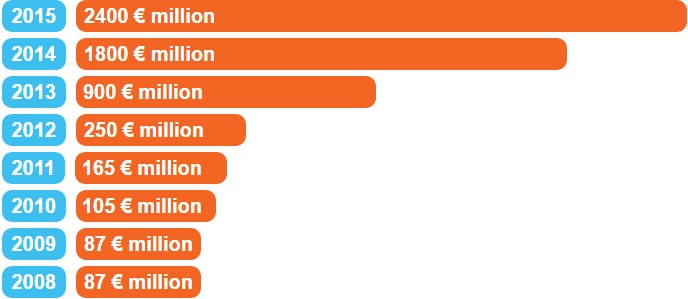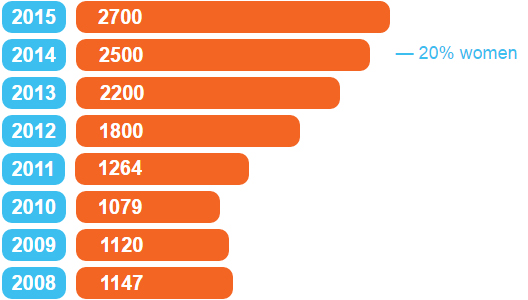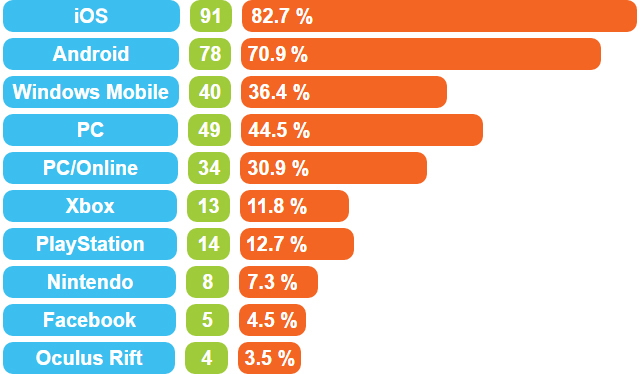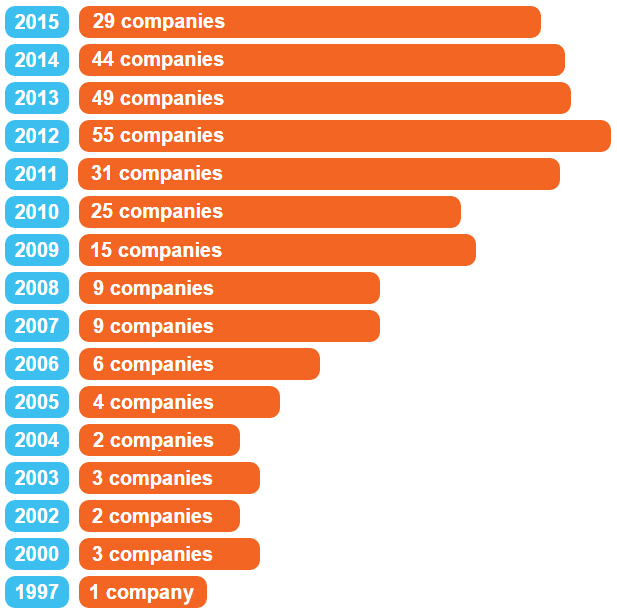What does the Finnish gamedev industry look like? What are the conditions in Finland to invest in games? Can a foreigner start a company in Finland, and get support? We talked with Oleg Paliy about these and many other things.

Image Credit: www.helfi.ru

Oleg Paliy, Senior Business Advisor at KAATO Gaming
Hi! Let’s start from the beginning. How old is the Finnish game industry?
Hi. The first Finnish game was released in 1986. If you take it for the starting point, then the Finnish game industry turns 30 this year.
What’s the turnover of the Finnish game industry today?
In 2014 the turnover reached €1.8 billion, and last year it already was €2.4 billion.

Chronology of the overall turnover of the top game companies in Finland
And how does the Finnish game industry look like in general today?
It’s a tough question. If we are talking about the number of developers, then Finland hosted around 2700 of them last year with little less than a quarter being ladies. The number of companies in the industry has reached nearly 290.

Number of people involved in the game industry of Finland
Most of them are developing games for mobile platforms.
But how did it happen that today Finland is one of the major global leaders in the mobile game industry?
This is a frequently asked question. And it has a simple answer to it. They had Nokia and it pulled the whole industry into the future.
But, you know, I want to mention one key thing. In 2003-2004 Nokia attempted to enter the world of portable consoles with N-Gage. It was both a phone and a gaming console with cartridges. And many Finnish game companies concentrated on it right then.
The console did not make it, but the focus of the companies remained. The competencies have remained as well. And when the java-platform was starting to gain popularity, the developers simply switched from writing games for N-Gage to making java-games. It has pulled the rest of the industry with it. Plus, you should not forget about Nokia, which, although, had suffered terrible losses due to the dotcom bubble burst, yet continued to actively contribute to the IT sector development in the region.

The popularity of game platforms among game developers in Finland
I have also come across the opinion that Finland hosts a very solid and united game community. Is it true?
Yes, I think that this is one of the key factors to success. KooPee Hiltunen from Neogames is considered to be the founder of the game community in Finland. I am glad that he will also report at our event.
They have a serious IGDA game hangout. Also Game Jam. The latter is a nonprofit company which promotes game development as a hobby. It has around 700 supporters right now.
These companies conduct regular events where people develop games without commercial interest and desire to make money. This is popularization of game development as hobby, nothing else.
Do you really need it? Doesn’t a hobby support like this generate tons of trash?
Game development popularization leads to having new people in the industry and turns some people away from making games.
Plus, you will have a community, in any case, the question is how it will look like?
The support of this community by large companies (including as sponsors or organizers of events), the fact is that employees of Rovio and Supercell are its members… All of it tells us about the high level of educational work. So, I think the answer to your question is obvious.
For instance, Supercell conducts Games First once a year. This event is conducted in Helsinki solely for Finnish game developers. They do not let consultants or ad networks enter it. They bring platforms to these events, invite developers to listen to them and talk solely about games.
This is sort of enlightment we are talking about here.
This sounds like a commercial project. A platform for headhunting.
I would agree. Such events are sponsored by successful Finnish companies. But I am sure it is not limited to that.
When people meet each other, share experiences, discuss things: what works and what does not – it allows learning from each other and from more successful colleagues. This develops the whole industry. In Finland companies that generate over one million Euros in sales are just 10% of the whole market.
It’s a lot.
As I said there are about 290 companies incorporated in Finland producing games. 20 of which generate over one million Euros a year. Or even less. This is quite normal for the gamedev industry.
How does the interaction between the state funds and developers normally happen?
The most serious state investor into game developers in Finland is Tekes.
Tekes invests around €600 million in R&D, into new developments, into company support. In the past Tekes invested in Rovio, Supercell, Remedy and Seriously. Generally, absolutely all prominent Finnish companies received support from Tekes at some stage.
What are the conditions it operates upon?
Tekes is a state fund. It is not pursuing generating income on companies as such. They give money to companies as grants to some R&D projects. It can easily be a development of a new model of monetization, development of new approaches to user engagement, development of various platforms, to be later used in a range of game titles, etc. Tekes does not give money for plain game development, they require some innovative approach, which would allow them to say, that yes, it is an exciting R&D project and we are ready to invest in its development.
Tekes always work on the project basis. A company files an application and it is reviewed from a week to 2 weeks. They have some internal processes but right now the time-to-decision has significantly expedited. Tekes has a program that is targeting the development of the gaming cluster. During the whole era of game studios in Finland, over 100 companies received money from them.
And how can the companies that are only formally Finnish get these benefits? For instance, the development is conducted in St. Pete and the guys go to Finland to organize an office and raise investments. Is it possible to get investments from the Finnish government in this setup?
Tekes looks at the project, which is very intensive in terms of R&D and gives from 50% to 70% needed by the project in a form of a grant. Or they also can give you a long-term loan under 1% or less. It can be a regular or convertible loan. There are a number of options. You can talk to them and they are rather flexible. They have been in this business for a long time and have developed approaches in terms of lawyers and so on.
As for the companies that are only formally deemed Finnish, you have to understand that it is not quite the case that Tekes is after. They give the money – Supercell and Rovio in the past received quite large investments from them – with an idea that these companies would return the money in a form of taxes. These taxes will be paid either by the company or by the employees.
Another mandatory condition while working with Tekes is that IP of the project under development will belong to the Finnish company. I.e. in the event that the IP of the project is kept by the Finnish company.
Formally Finnish or actually Finnish?
There is no such thing as a “formally Finnish company”. Here, the company needs to be registered in Finland and hold the rights to the project’s, service’s, or whatever IP. In this case, the R&D center can be located in St. Pete, Moscow or Krasnoyarsk. We had a case when guys with R&D center in Kiev received a grant from Tekes. Each situation is considered individually. But if it’s a Finnish company without a single employee in Finland, if it’s just on paper, that’s not their case. They will not treat it good.
Can you name some real cases where the development was not based in Finland and the studios got the grants anyway?
This is a company where IP plus the product manager and the operating officer are located in Finland. And this makes sense by the way. Because in Finland there are some smart people from the product management perspective. The format where the product management is located in Finland and the engineering is, for instance, in Russia represents some of the cases.
But can you name some concrete cases?
I simply do not know if the companies with concrete cases really want to be publicly exposed like this. But there are cases. There are successful companies with Russian and foreign founders that got money from Tekes. There are cases like this.
But what if there is a company that just wants to relocate? Say, a Russian company that wants to be Finnish. How hard is it to accomplish this?
It is rather easy to do. The company registration takes a couple of days. You can register a company in Finland online, you don’t even need the registration office for that. But there is one “but”. There are two state languages in Finland: Finnish and Swedish. So you will need to fill out the form online in one of these languages.
BTW, we in KAATO, business community working in cooperation with Invest in Finland/Finpro (non-profit organization assisting foreign companies in developing businesses in Finland) help the companies specifically with this. This is what my work with game developers is all about – helping the companies to start properly in Finland.
For example, I have guys from St. Pete that are relocating right now. They have a gamedev office in St. Pete, Ukraine, and the Czech Republic. So, their management is moving to Helsinki and R&D stays.
So, if a company wants to move and start, it is done rather smoothly. It is fairly easy to find experts in Finland that will be able to help.
Arja Martikainen the founder of Games Jobs Finland will be reporting at the Finnish Game Day. She helped and keeps helping all the prominent game companies with recruiting.
We will also have Cyril Barrow, VP Operations of Rovio. He used to open the office of Gameloft in Finland. And Arja was helping him with recruiting here.
The gamedev industry in Finland is well established, therefore there is some pool of recruiters focused on this industry. That’s why it is fairly easy to find a needed specialist. Again, due to having regular game events and a monthly IGDA meetings, where any company can become a sponsor, introduce itself, and announce opening an office in Finland and its vacancies.
At the events that are held, companies can find partners, because for registering a company in Finland you need to have at least one of the board members with EU residence permit. This is a normal practice in all of the Europe. You will not be able to open a company in any EU country without it.
We have just talked about the positive sides. But there are likely some downsides that one should remember when thinking about opening a company in Finland or relocating from another region? What are the hidden risks or demerits here?
OK, but let me finish with the upsides first.
Finland is a country where accounting is done only in digital form. You don’t need a lot of paperwork, everything is done rather simply and transparently. Respectively, the tax authorities have all the possibilities and interfaces to ensure that all of the document turnover and communication be conducted in electronic form. I also consider it to be a big plus comparatively to administering a company in Russia. Or in all the Eastern Europe, where the bureaucracy steps down slowly and it takes time. You need to understand that if you have a company in Finland but you sell and develop the product elsewhere, the administrative burden is significantly decreased.
And the downsides?
Finland is rather expensive from the perspective of competent resources when compared to Russia. Development in Finland is costly, which can be one of the hurdles. The normal daily pace in Finland is so that people come to work early and leave the work also early. The day starts at 8 and lasts until 4-4:30 pm.
Finns are pleasant to work with, they are trustworthy, but you have to consider some specifics. They will not sit in the office long hours at night – they prefer working within strictly delineated working hours.
Since we are talking downsides now. When we mention Finnish developers everybody remembers Supercell, Rovio, and Remedy. But how many are there names that fail? How do they repay to the government after that?
Yes, there are companies that raised the money and could not make it. There are cases like this. I think there are quite a few of them.
So how do they repay?
Finland is a country with clear and concrete rules. An audit will be certainly conducted in this company. It always happens if a company falls into default. And if the audit does not reveal any malice practice in bankruptcy, then we have the rules of limited liabilities applied, since this is what the companies are, generally, the LLCs.
Finland does not feature a long list of forms of incorporation. Out of 290 gamedev companies in the country are companies with limited liabilities or LLCs. In Finland, they are called “stock companies”. There are some with 100% stock belonging to several or one person. The company’s liability is limited by the authorized capital. This is the only thing at risk with the company. Around 15-20 gamedev companies are private entrepreneurs. These are the people who independently develop games, publish them and gain profit. And around 10-15 companies are gamedev cooperatives. Cooperatives are mostly student projects, they do not set the goals to gain guaranteed profit and have some IP. They appear on the horizon because there are 25 colleges in Finland where gaming is taught. But most of them are limited liabilities companies.
There is such trend in Finland… Last year 20-30 companies were created by so-called “second circle startupers”. This means that the founders organize a second company, not their first.
The first one failed?
There can be a range of reasons. But the first one does not exist anymore. It’s called second round startups. There was an analysis of this trend and everybody decided that it talks about some sort of maturing of the gamedev industry. Clearly, when people are not new to opening a company, they know a lot more about it, then those who establish their first business. So this is the trend we are witnessing now. And most startups in the gamedev industry are second round startups right now. And the total number of newly established companies is diminishing. And quite radically. In 2015 only 29 new companies opened. Compare it with 44 established in 2014.

Dynamics of new companies emerging in Finland
You might say that the industry is maturing.
